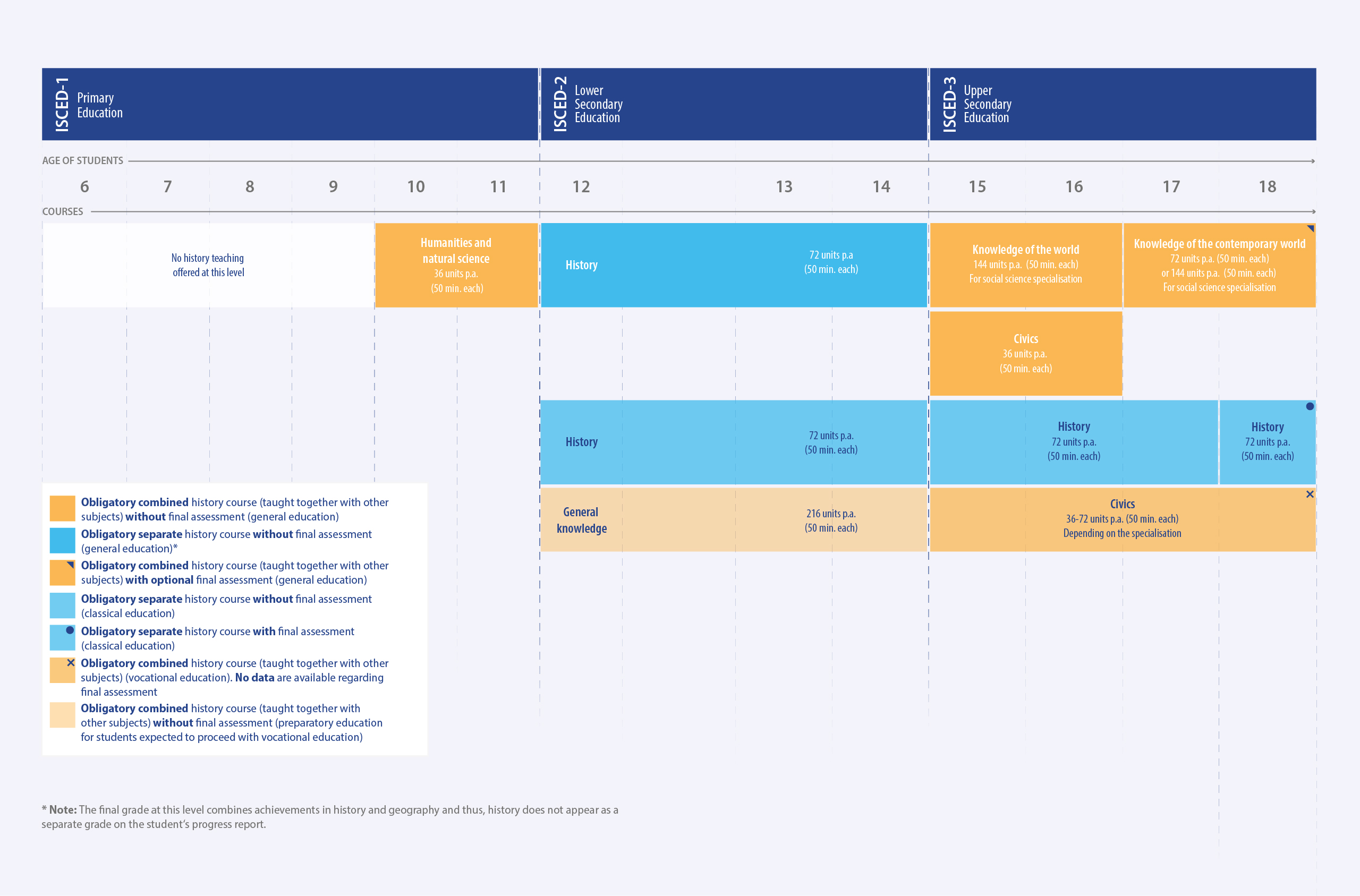
OVERVIEW
In Luxembourg, history is taught as part of a compulsory multidisciplinary subject in the last two years of primary school. During secondary education, students following the classical education route are required to take history until their final year of schooling, including a final assessment. Students following the general education and vocational education routes are required to take one or more multidisciplinary courses (depending on the route); for general education, a final assessment in the last year of schooling is optional.
History courses follow a chronological and/or thematic organisation. The National Ministry of Education, Childhood and Youth defines the curricula of state schools in Luxembourg, however these also allow for a flexible approach to teaching. Civil society organisations participate in curriculum design, and private schools may offer different history curricula from those used by state schools.
Assessment methods include knowledge-based questions and source-based questions. History textbooks and other educational resources are selected and approved by national commissions, and teachers are permitted to use materials not licensed by the authorities without any restrictions. History teachers are required to hold a university degree (bachelor’s or master’s depending on the post), demonstrate language competence in both French and German, pass a competitive selection procedure and complete an initial teacher-training programme lasting three years. In-service professional development courses are compulsory and are administered during formal working hours.
Download high-resolution schematic
FURTHER INSIGHTS

HISTORY IN SCHOOL
History is taught as part of a compulsory multidisciplinary course, “Humanities and natural science”, in the final two years of primary school (ages 10-11). Throughout lower secondary education (ages 12-14), “History” is a compulsory course for both students following the classical route and those following the general route. Here, their final grade combines their achievements in both history and geography (therefore there is no separate grade for history on students’ progress reports). At upper secondary level, students in classical education continue to take “History” until the final year of schooling, including a final assessment. Those in general education take the multidisciplinary courses “Knowledge of the world” (ages 15-16), “Civics” (ages 15-16) and “Knowledge of the contemporary world” (ages 17-18); the latter has an optional final assessment. For students following the vocational route, history is included in the compulsory multidisciplinary courses “General knowledge” at lower secondary level and “Civics” at upper secondary level.
At the primary and lower secondary levels history is generally taught in German, while at the upper secondary level it is generally taught in French. There are private schools in Luxembourg which may follow distinct history curricula.

HISTORY CURRICULUM
The National Ministry of Education, Childhood and Youth controls the curricula of state schools in Luxembourg. The national history committees define the main lines of the curriculum. While the history curriculum broadly outlines what is to be taught, it allows for a flexible approach to teaching. Specific curricular content is sometimes generated by a school, or consortium of schools, and then validated by the national, regional or other competent authorities. Teachers have the freedom to choose areas of the broad curriculum to emphasise aspects they consider appropriate. The education authorities report that civil society organisations do not participate in curriculum development. Data on whether minority groups participate in curriculum development are not collected in Luxembourg.
|
AIMS REPRESENTED “VERY WELL” OR “QUITE WELL” IN THE CURRICULUM |
PERIODS |
GEOGRAPHICAL SCOPE |
APPROACHES |
|
|
|
|
The authorities report that minority groups (cultural, ethnic, linguistic, national, religious or sexual/gender) are included in the history curriculum.
Curricula workstation by GEI (History curricula search by country)

ASSESSMENT AND EXAMS
The assessment methods teachers are required to use are knowledge-based questions and source-based questions.
End-of-stage examinations are taken for the compulsory upper secondary course “History” in the classic secondary education track (enseignement secondaire classique). For the general secondary education track (enseignement secondaire général), the end-of-stage examination for the compulsory upper secondary course “Knowledge of the contemporary world” is optional. The examinations are set at the national level.
End-of-stage examinations assess the following fields of knowledge: historical content knowledge, historical thinking competences (e.g., critical analysis and evaluation of evidence, formulation and justification of historical arguments, consideration of different perspectives).
End-of-stage examinations are written and include open-ended questions, close-ended questions and source-based questions.

TEXTBOOKS AND OTHER RESOURCES
National commissions select and approve history textbooks and other educational resources. Teachers are permitted to use materials not licensed by the authorities without any restrictions.
Policies on the use of different types of educational resources are as follows:
|
|
|
International TextbookCat (GEI collection of Textbooks and Educational Media)

HISTORY TEACHERS AND THEIR EDUCATION
Candidates are required to pass a competitive selection procedure at the national level organised by the Ministry of Education. They must also complete an initial teacher-training programme lasting three years. They must demonstrate language competence in both French and German and must hold a university degree (bachelor’s or master’s depending on the post).
At the primary level, teachers are trained to teach history and one or more other discipline(s). At the secondary level, teachers are trained exclusively or primarily as history teachers.
In-service professional development courses are compulsory and are administered by the Institut de formation de l’éducation nationale (IFEN) during formal working hours.
Luxembourg Association of Teachers of History (presentation by EuroClio)
The information in the sections above is an excerpt of the thematic and general data presented in the following OHTE publications:
2022: Pandemics and natural disasters as reflected in history teaching
2023: OHTE General Report on the State of History Teaching in Europe



